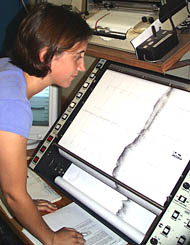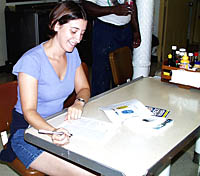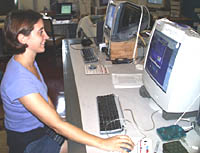|
|
Interviews: Clare Williams
Rachel:
How did you manage to come to UCSB this year, and what are your main responsibilities on board during this cruise? Clare: I applied to the Education Abroad Program at the University of Leeds in the UK. I had to be a good student to qualify, and I had to write a good essay about why I wanted to go to UCSB. I’m a watch stander on Rachel’s watch team. I keep a log of the data we are collecting and make observations by watching the computer monitors, which display all data and pictures sent up to the ship from the instruments that we are towing near the seafloor. All of the notes and data that I am recording will be used to make maps. I can't wait to help do this! This has been a really incredible experience seeing all this detailed imagery of the seafloor underneath us. It's almost like we are flying in a plane over the seafloor topography with all the water drained out. I am amazed at how we can see such fine-scale details in the records. Rachel: Is this your first time on a research cruise? Are you getting used to the daily routine on board? Clare: It is my first time doing science on a research ship and I love it! The main reason I wanted to go to UCSB was to have a chance to participate on a marine expedition. I am getting used to being up early but it took a few days to switch over. For eight hours each day I stand watch. Six to eight hours a day I spend sleeping in my cabin below the main deck (although I get the feeling that as the cruise continues that we will have lots more to do, so I’ll probably be sleeping less). During the rest of the day I have homework to do for a seminar class that is being taught at sea, and I help do whatever needs to be done to help with the surveying. I also eat delicious meals in the mess hall. It’s terrific not having to cook or clean up after meals. The cooks out here really do an incredible job feeding all 50 of us. I relax when I can by reading or going out on deck to watch the beautiful sunsets.
What do you like most about being at sea? Clare: I really enjoy meeting new people and learning new things every day. Also, being on the water here in the tropical Pacific Ocean is fantastic. It is a gorgeous dark blue. The marine life is also fun to see. Today I saw flying fish scoot out of the water and sail many meters across the top of the sea surface. I guess they were trying to keep from being lunch! I also saw a flock of tropical open-ocean seabirds, called boobies, that swooped about and perched on the masts of the ship. Rachel: What do you like least about being at sea? Clare: I didn’t like feeling seasick at first but now the rolling of the boat doesn’t bother me. I also love to exercise and even with all the bikes, weights and stair-steppers out here, I know I’m not getting as much exercise as I am used to. I also don’t like the feeling of not being able to see the sunlight in my room. I am sleeping in a cabin below decks where there is no sunlight. When I wake up, I don't know at first if it is day or night.
|
||||||
|
|
|||||||
© 2010 Dive and Discover™. Dive and Discover™ is a registered trademark of
Woods
Hole Oceanographic Institution



